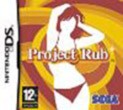Review: Project Rub
Posted 18 Feb 2005 at 04:26 by Conor
When's the last time you told a game that you loved it? You may think it, you may write it on games forums, but when's the last time you actually said to a game "I love you!"? Nope, didn't think so. The extreme rarity of this is what makes your jaw drop when Feel The Magic, out of nowhere, asks you to shout it. Would you shed your inhibitions and just do it? Or would you stare at it meekly, your eyes darting about to see who's within earshot. You don't have to if you don't want to, it's not compulsory - but that's not the point. If you're willing to throw caution to the wind and play along you'll enjoy FTM much more: because it demands a little more from the player than other DS games.
Do you come here often?
Not that it'll have a hard time getting anything off you, when the package before you is so appealing. Nothing else on the DS at the moment has its visual desirability – and it's the first thing to hit when you flick on the power button. Like the sexy redhead in the corner, her flashes of leg and scarlet lipstick will make you weak at the knees, and instantly seduce you. Sonic Team have created a game garbed in bold colours, screaming and grabbing your attention. Both the protagonist and the female you're trying to woo are presented as silhouettes; completely featureless and completely beautiful. Who would've thought faceless characters would invoke so much empathy?
More than even the addictive mini-games, FTM works because of the crazy presentation. The plot takes its cue from it, your untypical tale of boy-meets-girl, boy-joins-bunny-club, girl-gets-attacked-by-random-bosses, boy-must-complete-silly-mini-games-save-her. Early reports suggested a game in the style of those obscure Japanese dating games, but FTM is so far removed from the conventions of the genre. Rather than act as ruler of the gameplay, it's relegated to a simple catalyst, an excuse for a series of mini-games. It's hard to think of any plot that would justify your character rolling himself up in a ball and being bowled across a busy street to knock over pedestrians like bowling pins… but in the surreal world of FTM, it all makes strange sense.
Probably because the plot is told through delightfully minimalist cut-scenes, switching between the DS' screens like panels on a comic page, punctuated with audio outbursts and anime-esque backgrounds. Dialogue is rare, and any use is unspoken, only printed on one screen with the scene or blackness in the other; always keeping a distance between the characters and their own characterisation.


The plot unfolds in striking style
This restraint is remarkably effective. The game need not attribute either of the two characters any set personalities, because they are filled in by the player and by the tone of the game. Thanks to the DS' touch screen, barriers between the players and the figures you're controlled are eroded: you really do become the guy, and you really to try and woo the girl. When you're rubbing her clean, or shouting to her, or trying to hold her hand in the park, it all seems quite genuine. The sexless imagery of a bikini-clad female posing provocatively on the game box, manual and opening screen betray the tenderness the player is asked to treat the in-game girl with. It may catch the eyes of virginal teens looking for another Leisure Suit Larry but there's little vulgar about the game itself. If you find your stylus wandering, the girl will scold you and yes, make you feel just a tad guilty. You can unlock new costumes and dress her up if you want but you'll most likely end up keeping her the way she is. Because you've went through a lot with her during the course of the game, and dressing her up for a little perverted joy just doesn't feel right.
From the other side of town
It's impossible not to find yourself attached to the insanity of the game. The way images of hearts and figures and rainbows cascade in front of you, melting and folding into each other, the reds and pinks and oranges creating a cocktail of visual joy, a world presented in the most bizarre terms. The game's fascination, for example, with rabbits is inexplicable but endearing. As is the background characters' fascination with dancing to the game's tune – no matter what's going on, they're still keeping that funky beat. You can't help but smile at it, and nod along, because FTM's soundtrack is so utterly delirious; stopping and stalling and racing ahead with a strange, comforting warmth. During the heat of the mini-games it reduces to a steady, pulsating rhythm to bump up the tension, but when you pass it erupts in a triumphant burst of cheer that strokes your satisfaction.
Equally heart-warming is the ingenuity of the mini-games that make up the game. Battling raging bulls, performing acrobatic miracles, spray painting hearts on walls; it's all quite random. Like the mini-games of SM64 DS, which have captured the hearts of many DS players, they make full use of the console's functions. What is more noticeable about FTM, though, is how much more it does so.
The first time the game prompts you to blow on the screen, it's a revelation. Blow on the screen? The screen has always been a barrier between you and the game, a window to the world on the other side – a world you weren't allowed to touch. The implications of the touch screen start to become very apparent in FTM; the game challenging you to break your traditional caution. This kind of use of the DS' functions is wonderful at first, but unfortunately slips into novelty territory after a couple of sessions. Huffing and puffing at your console is a welcome break from the norm, but it's also damn tiring. The bulk of the mini-games rely on more simple touch-based play, and it's on these mini-games that FTM impresses.
Wild times
And I'm happy to report that, for the most part, the games are delightful and addictive. Unfortunately there's not nearly enough of them. The Story Mode is played through in eighteen stages (or 'scenes') each containing from one to three mini-games. Most, however, are only the one; these are the plot-based ones, and these are the ones less likely to inspire replay.
The real treat of FTM lies in a small handful of mini-games. 'Parachute' demands you type in numbers of a calculator to save parachuters, forcing you to beat the keypads with superhuman speed. The later levels leave you a staggering, sweating mess, your heart racing and your hands shaking. 'Monocycle' demands the steadiest of steady hands as you guide your hero along narrow ledges on the titular vehicle, the tension palpable. A later level replicates this with longer, more complex tracks. And sharks. 'Painter' makes great use of the touch screen; you have to paint inside given shapes, avoiding more falling parachuters and racing against a tight time limit.
The fierceness of FTM's mini-games can be overwhelming at times, but it's in these times that it comes into its own. When the clock is bearing over you, booming with each infernal second, taunting your loitering. Your brain is telling your hand to hurry up but your fingers are screaming back – we'll go outside the lines, you have to be careful! Carry out your task with enough precision and raw determination and you might just squeeze in with a second to spare. Make the slightest mistake and your eyes, like the screen, will blaze red. You'll bang your DS against your legs in frustration and probably hit the power button in disgust, but you will be tempted back.
Because there are harder difficulties to unlock. And they want your blood.
Tis better to have loved
But this will probably pass. Like its subject matter, FTM isn't always the girl you want it to be. It'll infuriate and irritate you to no end, but it'll also evoke a level of wonder and satisfaction to eclipse it. It has looks to kill, but you can't help but wish there was more substance to it. It will bore you at times, but invite you to return too. The ending will arrive quicker than you would've hoped and will perhaps leave you feeling a little bit empty. But, like its subject matter, you're better for having gone through it all.
N-Europe Final Verdict
One of the DS' more distinctive experiences: fresh and vivid but limited. Let's hope for a sequel.
- Gameplay4
- Playability4
- Visuals4
- Audio4
- Lifespan3
Final Score
8
Pros
Intoxicating presentation
Simple and compulsive
Interesting use of DS features
Cons
DS use can grow gimmicky
More quality minigames needed

























